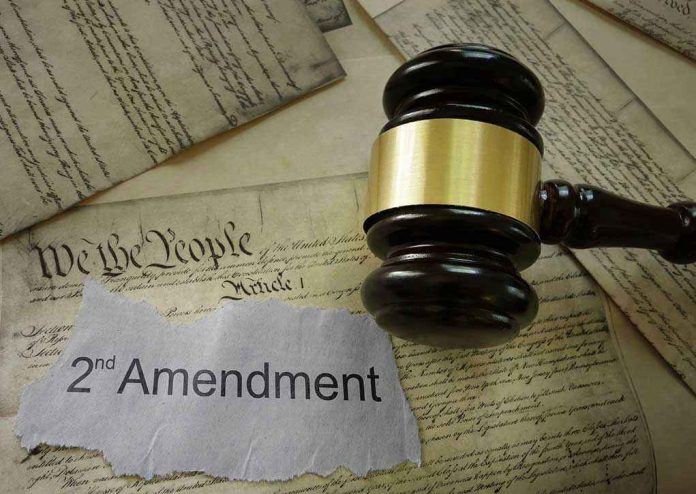
Federal courts have once again sided with government overreach, upholding a discretionary gun permit system in Rhode Island that many see as a direct threat to Second Amendment freedoms.
Story Snapshot
- Federal judge upholds Rhode Island’s dual gun permitting scheme, rejecting Second Amendment challenges.
- Attorney general retains sweeping discretion over open and unrestricted carry, raising concerns for gun rights advocates.
- Recent Supreme Court decisions on gun rights spark debate on the constitutionality of “may issue” permit systems.
- Ongoing legislative efforts signal continued battle over gun rights and permitting in Rhode Island.
Federal Judge Sides with Discretionary Permitting over Constitutional Gun Rights
On August 1, 2025, U.S. District Judge William Smith ruled that Rhode Island’s controversial dual gun permitting system does not violate the Second Amendment, dealing a blow to gun owners and advocates for constitutional carry. The decision dismissed a lawsuit brought by Michael O’Neil and the Rhode Island 2nd Amendment Coalition, who argued the permitting process—giving both the attorney general and local officials power to issue concealed carry permits—was unconstitutional. At a time when recent Supreme Court decisions have expanded gun rights, this ruling keeps in place a structure that allows significant government discretion over citizens’ right to bear arms.
The heart of the controversy is Rhode Island’s unique system, which splits authority between local officials and the state attorney general. Local officials are required to issue concealed carry permits to applicants who meet clear statutory criteria, yet the attorney general wields broad discretionary power for open or unrestricted carry permits. This dual approach has its roots in Rhode Island’s gun laws—specifically R.I.G.L. § 11-47-11 and § 11-47-18—which reflect a national debate between “shall issue” systems, where permits are granted if objective standards are met, and “may issue” systems, where authorities can deny permits based on subjective judgment. For many conservatives, these subjective criteria open the door to arbitrary denials and erode the constitutional protections enshrined in the Second Amendment.
Supreme Court’s Bruen Decision Ignored in Rhode Island Ruling
Gun rights supporters had hoped that the 2022 Supreme Court decision in New York State Rifle & Pistol Association, Inc. v. Bruen would force states like Rhode Island to abandon “may issue” permitting in favor of objective standards. The Bruen decision struck down New York’s “proper cause” requirement as unconstitutional, prompting legal challenges to similar laws nationwide. However, Judge Smith’s ruling distinguished Rhode Island’s system from New York’s, arguing that the state’s “shall issue” pathway for concealed carry preserves constitutionality, while the attorney general’s discretionary authority remains intact. Critics contend that this interpretation guts the original intent of Bruen and preserves bureaucratic obstacles for law-abiding Americans seeking to exercise their rights.
Attorney General Peter Neronha, who defended the permitting scheme, justified the system as necessary for public safety, but for many, this is simply another example of government officials holding unchecked power over the constitutional rights of citizens. The decision underscores a persistent divide, with state officials and public safety advocates touting discretion as a tool to prevent dangerous individuals from carrying firearms, while gun rights groups argue that any form of “discretionary” permitting is an affront to individual liberty and the Second Amendment.
Legislative Battles and the Road Ahead for Gun Rights
Despite the federal court’s decision, the fight over gun rights in Rhode Island is far from over. Legislative efforts, including Senate Bill 142 (2025), aim to reform permit requirements and even propose permitless carry for residents. The General Assembly faces ongoing pressure to strike a balance between public safety and fundamental rights, but the reality is that as long as discretionary permitting remains law, gun owners will continue to face hurdles and arbitrary denials. The recent court decision preserves the status quo, but with plaintiffs considering an appeal and lawmakers debating further reforms, the legal and political struggle shows no sign of ending.
For conservative Americans, Rhode Island’s situation is a cautionary tale—a reminder of how quickly constitutional rights can be undermined by judicial rulings and legislative inaction. As debates over gun permitting systems continue nationwide, the core issue remains unchanged: whether the government should have the power to decide who gets to exercise their rights, or whether those rights are guaranteed to all law-abiding citizens. The answer will have profound implications not only for Rhode Island, but for the entire country as courts and lawmakers grapple with the future of the Second Amendment.
Sources:
Rhode Island Senate Bill 142 (2025) – Full Bill Text
Judge rules that Rhode Island’s gun permit system does not violate Second Amendment – ABC News
Rhode Island Attorney General – Pistol Permits Guidance
House Bill H5654 (2025) – Rhode Island General Assembly
House Bill H6042 (2025) – Rhode Island General Assembly





